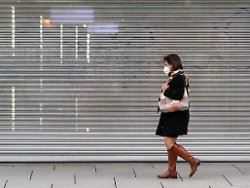Wednesday, January 06, 2021
Is there a new corona crash?
Top economists are calm
Retailers and restaurateurs fear bankruptcy in view of the tightened lockdown. But the economy as a whole will survive the crisis relatively well, say economists. They believe a strong recovery is possible in spring.
Leading economists consider the economic consequences of the lockdown to be manageable. The President of the Ifo Institute for Economic Research, Clemens Fuest, was also calm: "Our economy will do that," he told ntv. The measures imposed are tough for the industries affected, especially retail and gastronomy. But as long as industry and other companies with high added value continue to produce, "we can withstand it".
According to Gabriel Felbermayr, President of the Kiel Institute for the World Economy, the restriction of the corona hotspots' range of motion does not change anything. "If occupational mobility remains possible, the additional economic costs should be kept within limits," he told the "Welt". Tourism, gastronomy and shopping trips are not possible anyway. From the point of view of Michael Hüther, Director of the Institut der Deutschen Wirtschaft (IW), it is crucial that the trip to the production site remains possible.
IW Director Hüther sees it similarly. It is crucial that the industry is not affected. The German Institute for Economic Research (DIW) assumes that the prolongation of the hard lockdown will only have a short-term impact on the economic recovery. "If the infection numbers are effectively depressed, a strong recovery is possible in spring," said DIW economic chief Claus Michelsen of "Welt".
The federal and state governments had agreed, among other things, to extend the lockdown until the end of January and tighten contact restrictions. In addition, freedom of movement in corona hotspots is to be limited. From a 7-day incidence of more than 200 new infections per 100,000 inhabitants, the federal states should take local measures to limit the radius of movement to 15 kilometers around the place of residence, unless there is a valid reason.
"Risk of bankruptcies could increase"
However, the expectations of leading economists in terms of economic development have worsened due to the second corona wave and the ongoing lockdown. The German Institute for Economic Research (DIW) lowered its forecast for the growth of the gross domestic product (GDP) this year from 5.2 to only 3.5 percent. The Hans Böckler Foundation, on the other hand, considers growth "noticeably over four percent" to be possible.
The DIW expects an economic slump of over two percent in the first quarter of the year. A restart in the second quarter will only succeed if the wave of infections subsides by February and the restrictions can then be largely lifted, said DIW President Marcel Fratzscher to the "Handelsblatt". "If this does not succeed, the economy in Germany could suffer even longer and the risk of corporate insolvencies and unemployment significantly increase."
The original DIW forecast was significantly more optimistic than that of the Advisory Council on the assessment of macroeconomic development: In November – before the current hard lockdown – it predicted GDP growth of 3.7 percent for 2021. The chairman of the economy, Lars Feld, called this forecast "no longer tenable".
Ifo President Fuest also warned that the planned extension of the lockdown will delay the economic recovery. A prolonged closure of large parts of the retail sector will "at some point also have an impact on the demand for industrial goods" and could thus slow down the industrial recovery.
As long as industrial production and construction continue to develop positively, the economic slump will be much milder than in spring 2020, said IfW President Felbermayr. However, "partial easing" of the lockdown is expected for February at best. According to Felbermayr, his institute expects economic growth overall for 2021 – albeit "with continued enormous uncertainty".
No lockdowns in Asia
Economists at German banks also believe that the German economy will have a robust upswing this year, despite the tougher corona rate. "After a very weak start, the economy will pick up again from the second quarter," said ING's chief economist, Carsten Brzeski. "Despite lockdowns and a mutated virus, the prospects for a strong global upswing in the second half of the year remain good." In the USA and Asia, for example, there is no new lockdown, which means that industry and exports in this country should continue to run properly.
In the meantime, the Berenberg Bank calculated that every month of such a lockdown would reduce German economic output by around one percent in the quarter compared to a slow relaxation of restrictions. "This increases the risk that the German economy could shrink slightly in the first quarter, as was probably the case in the final quarter of 2020," said its chief economist, Holger Schmieding, referring to the new measures. But he, too, considers the basis for a new upswing to be solid. "As soon as the restrictions can be noticeably relaxed, perhaps in March, the economic lights should turn green," said Schmieding. "We expect strong growth for the second quarter, driven also by a backlog for many services."
. (tagsToTranslate) Economy (t) Corona crisis (t) Lockdown (t) Economic growth
